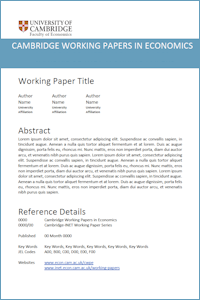
Gallo, E.
Communication networks in markets
CWPE1431
Abstract: This paper proposes a dynamic model of bargaining to analyze decentralized markets where buyers and sellers obtain information about past deals through their social network. There is a unique equilibrium outcome which depends crucially on the peripheral (least connected) individuals in each group. The main testable predictions are that groups with high density and/or low variability in the number of connections across individuals allow their members to obtain a better deal. These predictions are tested in a lab experiment through 4 treatments that vary the network that groups of 6 subjects are assigned to. The results of the experiment lend support to the theoretical predictions: subjects converge to a high equilibrium demand if they are assigned to a network that is dense and/or has low variability in number of connections across members. An extension explores an alternative set-up in which buyers and sellers belong to the same social network: if the network is regular and the agents are homogeneous then the unique equilibrium division is 50-50
Keywords: network, communication, experiment, noncooperative bargaining, 50-50 division
JEL Codes: C73 C78 C91 C92 D83
Author links: Edoardo Gallo
PDF: https://www.econ.cam.ac.uk/research-files/repec/cam/pdf/cwpe1431.pdf 
Open Access Link: https://doi.org/10.17863/CAM.5846
